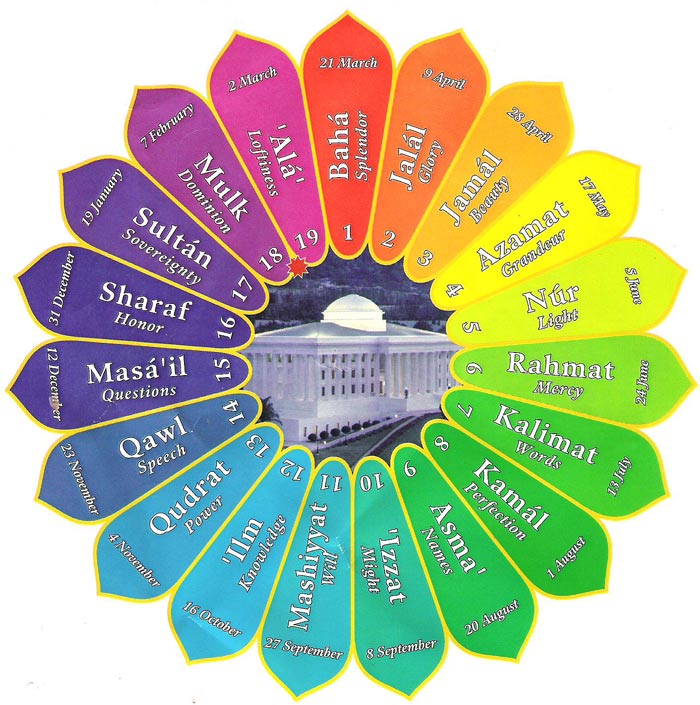The views expressed in our content reflect individual perspectives and do not represent the authoritative views of the Baha'i Faith.
Mercy: 1(e): A compassionate or charitable act… — Oxford English Dictionary.
“Mercy” (Raḥmat in Persian) is the name of the sixth Baha’i month in the 19-month, 19-day Baha’i Calendar. The month of “Mercy” lasts from late June to mid-July each year.

Badí Calendar
The idea that God is merciful is widespread among world religions. Mercy is often associated with forgiveness for sin. Justice demands more, but mercy mitigates the tough remedies that could otherwise be meted out by justice.
Certainly someone who is “in authority,” such as a sentencing judge, within the constraints of criminal law and procedure, has some discretion to show mercy by mitigating or commuting a sentence, depending on the facts and circumstances.
But everyday people, like you and I, are not judges. We do not dispense justice. We do not enforce the law. We do not punish those who break the law. If we did, we ourselves would be breaking the law by working outside of the framework of the justice system. In other words, we would be vigilantes, and therefore outlaws. Simply put, individuals cannot function as institutions of justice.
That being so, what might “mercy” look like in everyday life? How does this attribute of God translate into a human virtue? What could mercy look like in human action? How can we be merciful?
Let’s step back a minute and look at the attributes of God and their analogous human virtues from a wider perspective. For the purpose of reflection, it’s helpful to meditate on each attribute of God, as expressed in human action, one at a time. But these attributes, perfections, qualities, and virtues are really constellations of interacting attitudes, decisions, behaviors and results. Virtues work synergistically together.
That said, let’s refocus on the quality of “mercy,” and the surprising ways we can express and manifest mercy in practical action, with some guidance from the Baha’i writings. One way is to consider “mercy” as an adjective. Consider the word “merciful.” Here’s a Baha’i prayer for becoming a “merciful” person:
O my God! O my God! Verily, these servants are turning to Thee, supplicating Thy kingdom of mercy. Verily, they are attracted by Thy holiness and set aglow with the fire of Thy love, seeking confirmation from Thy wondrous kingdom, and hoping for attainment in Thy heavenly realm. Verily, they long for the descent of Thy bestowal, desiring illumination from the Sun of Reality. O Lord! Make them radiant lamps, merciful signs, fruitful trees and shining stars. May they come forth in Thy service and be connected with Thee by the bonds and ties of Thy love, longing for the lights of Thy favor. O Lord! Make them signs of guidance, standards of Thine immortal kingdom, waves of the sea of Thy mercy, mirrors of the light of Thy majesty.
Verily, Thou art the Generous. Verily, Thou art the Merciful. Verily, Thou art the Precious, the Beloved. – Abdu’l-Baha, Baha’i Prayers, pp. 112–113.
In this prayer, those assembled turn to God’s “kingdom of mercy.” This is the first time that “mercy” is mentioned in this prayer. These people seek to become “radiant lamps, merciful signs, fruitful trees and shining stars.” Here, we see a cluster of metaphors, each of which signifies a spiritual quality and action. For instance, a radiant lamp is a source of illumination and guidance to others. A “shining star,” guides the way during the night. A person metaphorically described as a “fruitful tree” not only is productive in life, but produces nourishing fruit for the benefit of others.
To be a “merciful sign” means to somehow exemplify the attribute of “mercy.” There are many ways to be merciful. Such actions are part and parcel of this constellation of qualities and actions that result in “service” to God, which really translates into “service” to humanity. After all, serving others is serving God. That’s the essence of spiritual life. Of course, to accomplish all this, those on the spiritual path of service need themselves to be guided, inspired, and illumined.
In addition to serving as “merciful signs,” the same people, treading the spiritual path in service to humanity, seek to become “signs of guidance, standards of Thine immortal kingdom, waves of the sea of Thy mercy, mirrors of the light of Thy majesty.” What makes it possible to serve as “waves of the sea of thy mercy” is the mercy of God: “Verily, Thou art the Merciful.” Here, “mercy” is not necessarily related to forgiveness from sin and shortcomings, as there is no request for pardon in this particular prayer.
This prayer, offered by Abdu’l-Baha on May 25, 1912 at Huntington Chambers in Boston, Massachusetts, asks for spiritual attainment. The discourse that precedes this prayer establishes the context, and describes the kinds of actions for which this prayer will help prepare each sincere member of the audience:
I am going away from your city, but I leave my heart with you. My spirit will be here; I will not forget you. I ask confirmation for you from the Kingdom of Baha’u’llah. I pray that you may advance continually in spiritual susceptibilities, that day by day you may grow more radiant and draw nearer to God until you become instrumental in illumining the world of humanity. May these confirmations of the Kingdom of God encompass you. This is my hope, my prayer. . . .
Therefore, we also must strive in this pathway of love and service, sacrificing life and possessions, passing our days in devotion, consecrating our efforts wholly to the Cause of God so that, God willing, the ensign of universal religion may be uplifted in the world of mankind and the oneness of the world of humanity be established.
In your hearts I have beheld the reflection of a great and wonderful love. The Americans have shown me uniform kindness, and I entertain a deep spiritual love for them. I am pleased with the susceptibilities of your hearts. I will pray for you, asking divine assistance, and then say farewell. – Abdu’l-Baha, The Promulgation of Universal Peace, p. 146.
The context is clear: Abdu’l-Baha calls on people everywhere (here, “the Americans”) to establish “the oneness of the world of humanity” at home in America and abroad, through the instrumentality of the “Cause of God”—which refers to the Baha’i Faith; although this work can be done by all people of goodwill everywhere, no matter of what faith or persuasion.
So, to exemplify the godly attribute of mercy means showing forth the goodly actions of becoming “merciful signs” in creative and beneficial ways that make this world a better place.
“Waves of mercy” become “works of mercy.”

















Comments
Sign in or create an account
Continue with Facebookor